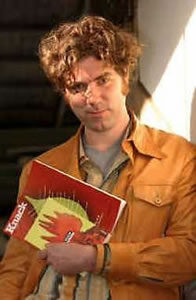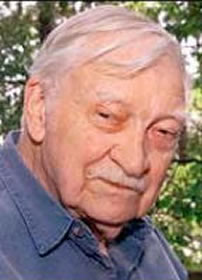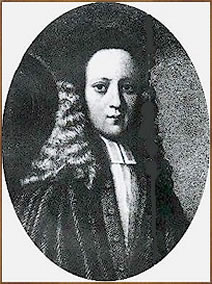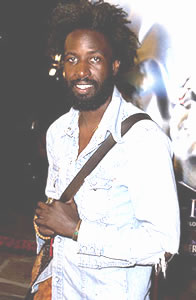De Amerikaanse schrijver en historicus Dee Brown werd geboren op 28 februari 1908 in Alberta, Louisiana en groeide op in Little Rock, Arkansas, waar hij met veel indianen bevriend raakte. Hij werkte als journalist, werd toen leraar en bibliothecaris. Zijn bekendste werk is Bury My Heart at Wounded Knee. Daarin beschrijft hij de ondergang van de indianen in Noord-Amerika vanuit hun standpunt.Zie ook mijn blog van 29 februari 2008.
Uit: Bury My Heart at Wounded Knee
“So tractable, so peaceable, are these people,” Columbus wrote to the King and Queen of Spain, “that I swear to your Majesties there is not in the world a better nation. They love their neighbors as themselves, and their discourse is ever sweet and gentle, and accompanied with a smile; and though it is true that they are naked, yet their manners are decorous and praiseworthy.”
All this, of course, was taken as a sign of weakness, if not heathenism, and Columbus being a righteous European was convinced the people should be “made to work, sow and do all that is necessary and to adopt our ways.” Over the next four centuries (1492–1890) several million Europeans and their descendants undertook to enforce their ways upon the people of the New World.”
Dee Brown (28 februari 1908 – 12 december 2002)
De Vlaamse schrijver Bart Koubaa (pseudoniem van Bart van den Bossche) werd geboren op 28 februari 1968 in Eeklo. Hij studeerde een jaar filosofie aan de Gentse universiteit en vervolgens 4 jaar film en fotografie aan de Koninklijke Academie voor Schone Kunsten (KASK), eveneens in Gent. Hij werkte een jaar als designer en begon toen te reizen. Tijdens een verblijf in Zuid-Spanje raakte hij gefascineerd door de Arabische cultuur, wat leidde tot twee jaar studies Arabisch aan de Gentse universiteit. Aanvankelijk was hij, onder zijn eigen naam, in Vlaanderen bekend als zanger en tekstschrijver van rockgroep Ze Noiz. In 2001 debuteerde hij als auteur, met zijn roman Vuur. Dit boek leverde hem meteen de prijs voor het beste literaire debuut op en bovendien schonk de Vlaamse minister van Cultuur er tijdens de Literaire Lente van 2002, 20.000 exemplaren van aan Vlaamse treinreizigers. In opdracht van het Gentse theater Arca schreef Koubaa in 2003, samen met Peter Terrin en Christoph Vekeman, Als tegen een berg : drie theatermonologen gebaseerd op de sysifusmythe. In 2005 volgde dan de roman Lucht.
Uit: Lucht
“En hoewel Kudo Yamamoto ook zijn herinneringen als een luchtbel beschouwde waarbinnen de storm van chemische elementen was gaan liggen, bleven bevroren beelden van de verwoestingen in Nagasaki hem op de meest onvoorspelbare tijdstippen plagen of dook de dode hond uit de brief van zijn oom te pas en te onpas uit de rivier om hem een knauw in zijn kuit te geven. Ik zit vol gaten, dacht hij, iedere dag word ik wakker met mijn oude herinneringen in het lichaam van een onbekende. Lang voor mijn geboorte was ik de achterkleinzoon van een samoerai met één oog, toen een vertaler op de vaalgroen verlichte twaalfde verdieping van een Wolkenkrabber en daarna een verstekeling in een kist op weg naar zijn geboorteland. ‘En nu een dichter zonder gedichten,’ klonk het uit de richting van het bos, maar Kudo Yamamoto had het niet gehoord en hij stak het brugje over en groette de visser met de lange grijze baard.”
Bart Koubaa (Eeklo, 28 februari 1968)
De Mexicaanse schrijver, filosoof en politicus José Vasconcelos Calderón werd geboren in Oaxaca op 28 februari 1882. Vasconcelos was geschoold als advocaat. In 1910 sloot hij zich aan bij de revolutionairen van Francisco I. Madero. In 1915 verliet hij het land na een conflict met de revolutionaire leider Venustiano Carranza maar na diens omverwerping in 1920 keerde Vasconcelos weer terug. Hij werd minister van onderwijs in het kabinet van Álvaro Obregón en deed veel voor de alfabetisering van de Mexicaanse bevolking. Vasconcelos gaf een groep schilders in 1922 de opdracht de muren van de “Escuela nacional preparatoria”, waar tevens het secretariaat voor Openbaar Onderwijs gevestigd was, van muurschildering en te voorzien. Hij is onlosmakelijk met de muralisten verbonden. Vasconcelos is echter vooral bekend als filosoof van het mestizaje, het mestiezendom. Vooral zijn boek La raza cosmica uit 1925 is bekend. Volgens Vasconcelos was de wereldgeschiedenis tot nu toe bepaald door vier rassen: het blanke, het zwarte, het Aziatische en het indiaanse. In Latijns-Amerika zou echter het vijfde ras ontstaan door een vermenging van de andere, dat het beste van de andere vier rassen wist te combineren. Vasconcelos was dus voorstander van de vermenging van rassen, en faliekant tegenstander van het sociaal-darwinisme. Vasconcelos’ ideeën zijn lange tijd heel invloedrijk gebleven in Mexico. Een vaak gehoorde kritiek op Vasconcelos is dat zijn opvatting van Mexico als mestiezennatie geen ruimte laat voor andere culturen, in het bijzonder de indianen, waarvan hij het bestaan in feite ontkende.
Uit: The Cosmic Race
“In Latin America … a thousand bridges are available for the sincere and cordial fusion of all races. The ethnic barricading of those to the north in contrast to the much more open sympathy of those to the south is the most important factor, and at the same time, the most favorable to us, if one reflects even superficially upon the future, because it will be seen immediately that we belong to tomorrow, while the Anglo-Saxons are gradually becoming more a part of yesterday. The Yankees will end up building the last great empire of a single race, the final empire of White supremacy. Meanwhile, we will continue to suffer the vast chaos of an ethnic stock in formation, contaminated by the fermentation of all types, but secure of the avatar into a better race. In Spanish America, Nature will no longer repeat one of her partial attempts. This time, the race that will come out of the forgotten Atlantis will no longer be a race of a single color or of particular features. The future race will not be a fifth, or a sixth race, destined to prevail over its ancestors. What is going to emerge out there is the definitive race, the synthetical race, the integral race, made up of the genius and the blood of all peoples and, for that reason, more capable of true brotherhood and of a truly universal vision. . . .”

José Vasconcelos (28 februari 1882 – 30 juni 1959)
De Duitse schrijver Berthold Auerbach (eig. Moyses Baruch) werd geboren op 28 februari 1812 in Nordstetten in het Zwarte Woud. In 1824 bezocht hij de talmoedschool in Hechingen, in 1827 de rabbijnse school in Karlsruhe. In 1832 begon hij aan een studie rechten, daarna filosofie in Tübingen, vanaf 1833 in München. Hij voltooide zijn studie in Heidelberg. Auerbach werd eigenlijk noodgedwongen schrijver. Hij werkte in Weimar, Leipzig, Dresden, Berlijn, Breslau en Wenen.
Uit: Der Tolpatsch
“Ich sehe dich vor mir, guter Tolpatsch, in deiner leibhaftigen Gestalt, mit deinen kurzgeschorenen blonden Haaren, die nur im Nacken eine lange Schichte übrig hatten; du siehst mich an mit deinem breiten Gesichte, mit deinen großen blauen Glotzaugen und dem allweg halboffenen Munde. Damals, als du mir in der Hohlgasse, wo jetzt die neuen Häuser stehen, einen Lindenzweig abschnittst, um mir eine Pfeife daraus zu machen – damals dachten wir nicht daran, daß ich einst der Welt etwas von dir vorpfeifen würde, wenn wir so weit weit auseinander sein werden. Ich erinnere mich noch wohl deiner ganzen Kleidung: freilich ist sie leicht zu behalten, denn Hemd, rother Hosenträger, und für alle Gefahren schwarzgefärbte leinene Hosen war ja Alles. Am Sonntag, ja da war es anders, da hattest du deine Pudelkappe, dein blaues Wamms mit den breiten Knöpfen, die scharlachrothe Weste, die kurzen gelben Lederhosen, die weißen Strümpfe und die klapsenden Schuhe so gut wie ein Anderer, ja sogar meist noch eine frisch gepflückte Blutnelke hinterm Ohr stecken. Aber es war dir nie recht wohl in dieser Pracht. Drum bleib’ ich bei dir in deinem Alltagskleide.
Jetzt aber, nimm mir’s nicht übel, lieber Tolpatsch, und mach dich wieder fort. Ich kann dir deine Geschichte nicht so in’s Gesicht hinein erzählen; sei ruhig, ich werde dir nichts Böses nachsagen, wenn ich auch per »Er« von dir spreche.”
Berthold Auerbach (28 februari 1812 – 8 februari 1882)
De Duitse dichteres en schrijfster Sophie Tieck werd geboren op 28 februari 1775 in Berlijn. Zij was een zus van de schrijver Ludwig Tieck en de beeldhouwer Friedrich Tieck. Voor haar was het niet mogelijk het gymnasium te bezoeken en zij ontwikkelde zich door zelfstudie. In 1799 trouwe zij met een vriend van haar broer Ludwig, August Ferdinand Bernhardi. Het huwelijk mislukte. Sophie sloeg aan het reizen door Europa, ;iet zich scheiden en trfouwde later opnieuw met baron Baron Karl Gregor von Knorring en ging met hem in Estland wonen.
Uit: Die Quelle der Liebe
“Der Morgen funkelte mit goldenen und purpurnen Strahlen auf Fluren und Wäldern, die Vögel stimmten ihren Gesang an, und wollten das Echo ermuntern, als sich schon die muntere Jagd des Prinzen Alwino in dem Walde ausbreitete. Die Vögel erschracken vor dem Hundegebell, und schwiegen mit ihren Liedern; Echo mußte jetzt den Waldhörnern antworten, und aus sanftem Schlummer wurde das Wild aufgejagt, floh bestürzt hin und her, und traf auf allen Wegen nur schnelle Hunde oder rüstige Jäger. Bald wurde der Prinz der Jagd überdrüßig, [4] stieg vom Pferde, und setzte sich unter einen schattigen Baum. Er blickte zu den Zweigen auf, wie die Blätter mit einander zu flüstern schienen, und von der Sonne vergoldet wurden, ein leiser Wind rührte die Zweige an, sie schüttelten alle die Thautropfen von sich ab, und ruhig stand der Baum, und der Wind schlich durch den Wipfel fort zu den andern. Nachdenkend saß Alwino, und so wie der Baum ihn mit seinen Thautropfen beregnete, wurde wieder alle Sehnsucht in seinem Busen wach, und er brach in Strömen von Thränen und in lauten Klagen aus: Fröhlich schwärmen die Freunde durch den rauschenden Wald, und keiner wird von so herber Qual bedrängt als ich; hören sie des Jagdhorns Töne, so stürzen sie muthiger dem scheuen Wilde nach, ach und ich – mich lockt der Klang, daß ich möchte in die weite Ferne rennen, mit dem schnellen Rosse die höchsten Berge erklimmen, und dann hernieder in die Thäler stürzen, und immer weiter, und mir so die Ruhe erjagen”
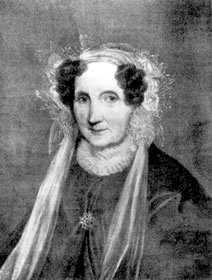
Sophie Tieck (28 februari 1775 – 1 oktober 1833)
De Franse filosoof, schrijver en politicus Michel Eyquem de Montaigne werd geboren in Bordeaux op 28 februari 1533. Zie ook mijn blog van 28 februari 2007 en ook mijn blog van 28 februari 2008.
Uit: Les essais: Sagesse humaine
“Le peuple se trompe: On va bien plus facilement par les bouts, où l’extremité sert de borne d’arrêt et de guide, que par la voie du milieu, large et ouverte, et selon l’art que selon nature, mais bien moins noblement aussi, et moins recommandablement. La grandeur de l’âme n’est pas tant tirer à mont et tirer avant comme savoir se ranger et circonscrire. Elle tient pour grand tout ce qui est assez, et montre sa hauteur à aimer mieux les choses moyennes que les éminentes. Il n’est rien si beau et si légitime que de faire bien l’homme et dument, ni science si ardue que de bien et naturellement savoir vivre cette vie; et de nos maladies la plus sauvage c’est mépriser notre être… C’est une absolue perfection, et comme divine, de savoir jouir loyalement de son être. Nous cherchons d’autres conditions, pour n’entendre l’usage des notres, et sortons hors de nous, pour ne savoir quel il y fait. Si avons-nous beau monter sur des échasses, car sur des échasses encore faut-il marcher de nos jambes… Les plus belles vies sont, à mon gré, celles qui se rangent au modèle commun et humain, avec ordre, mais sans miracle ni extravagance.“
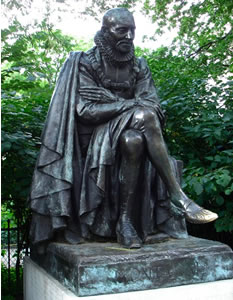
Michel de Montaigne (28 februari 1533 – 13 september 1592)
Standbeeld in Parijs
Rectificatie: De Griekse dichter Yórgos Seféris werd volgens de toen geldende Juliaanse kalender geboren in Smyrna (nu Izmir, in Turkije) op 29 (en niet 19) februari 1900. Zie ook mijn blog van 19 februari 2007 en ook mijn blog van 29 februari 2008.
Uit: Op de wijze van Y.S. en andere gedichten
De haven is oud, ik kan niet langer wachten
op de vriend die heenging naar het eiland met de dennen
op de vriend die heenging naar het eiland met de platanen
op de vriend die heenging naar de open zee.
Ik streel de roestige kanonnen, ik streel de riemen
opdat mijn lichaam herleven en besluiten zal.
De zeilen verspreiden enkel de geur
van het zout van een vorige storm.
Toen ik alleen wilde blijven, zocht ik
de eenzaamheid, maar niet zo’n wachten,
het verscheuren van mijn ziel aan de horizon,
deze lijnen, deze kleuren, deze stilte.
De sterren van de nacht brengen me terug naar Odysseus
die op de doden wacht tussen de asfodillen.
Landend tussen de asfodillen wilden wij
het ravijn dat Adonis gewond zag vinden.
Vertaald door Hans Warren en Mario Molegraaf
In the sea caves
In the sea caves
there’s a thirst there’s a love
there’s an ecstasy
all hard like shells
you can hold them in your palm.
In the sea caves
for whole days I gazed into your eyes
and I didn’t know you nor did you know me.
Yórgos Seféris (29 februari 1900 – 20 september 1971)
De Amerikaanse dichter en literatuurdocent Howard Nemerov werd geboren op 29 februari 1920 in New York. Zie ook mijn blog van 29 februari 2008.
Insomnia I
Some nights it’s bound to be your best way out,
When nightmare is the short end of the stick,
When sleep is a part of town where it’s not safe
To walk at night, when waking is the only way
You have of distancing your wretched dead,
A growing crowd, and escaping out of their
Time into yours for another little while;
Then pass ghostly, a planet in the house
Never observed, among the sleeping rooms
Where children dream themselves, and thence go down
Into the empty domain where daylight reigned;
Reward yourself with drink and a book to read,
A mystery, for its elusive gift
Of reassurance against the hour of death.
Order your heart about: Stop doing that!
And get the world to be secular again.
Then, when you know who done it, turn out the light,
And quietly in darkness, in moonlight, or snowlight
Reflective, listen to the whistling earth
In its backspin trajectory around the sun
That makes the planets sometimes retrograde
And brings the cold forgiveness of the dawn
Whose light extinguishes all stars but one.
Howard Nemerov (29 februari 1920 – 5 juli 1991)
De Zwitserse schrijver Martin Suter werd geboren op 29 februari 1948 in Zürich. Zie ook mijn blog van 29 februari 2008.
Uit: Der Teufel von Mailand
„Es roch nicht mehr schieferblau, und auch die Stimmen konnte sie nicht mehr sehen.
Das Zimmer lag im Halbdunkel. Durch die Jalousien drang gerade soviel Tag, wie Sonia brauchte, um ihren Weg durch die Möbel und Kleidungsstücke zur Tür zu finden.
Sie öffnete sie und stand in einer Diele. Durch die verzierten Milchglasscheiben der Wohnungstür drang das Licht vom Treppenhaus – und ging aus.
Sie tastete sich an der Wand entlang zu der ersten der drei Türen, die sie im Treppenhauslicht hatte erkennen können. Eine davon musste die Toilette sein.
Die Türklinke fühlte sich kühl an. Nichts weiter. Nicht zartbitter oder süsssauer, einfach kühl.
Sie betrat ein verdunkeltes Zimmer und hörte tiefe, regelmässige Atemzüge. Hörte. Nicht hörte und sah. Immerhin.
Leise schloss sie die Tür, tastete sich zur nächsten und stand in einer hell erleuchteten Küche.
Am Küchentisch sassen zwei Männer. Sie tranken schweigend Kaffee und rauchten. Überall standen halbleere Gläser und Teller mit Essensresten herum. Im Spülbecken türmte sich das Geschirr.
Die Männer schauten zur Tür, und an der Art, wie sie sie anstarrten, merkte sie, dass sie nackt war.
»Die Toilette?« fragte sie. Wo sie nun schon einmal hier war.
»Nächste Tür«, sagte der eine. Der andere starrte nur.
Sonia gönnte ihnen auch einen Blick auf ihre Rückseite und verliess den Raum.
In der Toilette stank es nach Erbrochenem, das jemand von der Brille zu wischen versucht hatte. Papier war keines mehr da.
Sie schaute in den Spiegel, um herauszufinden, ob sie so schrecklich aussah, wie sie sich fühlte.“
Martin Suter (Zürich 29 februari 1948)











